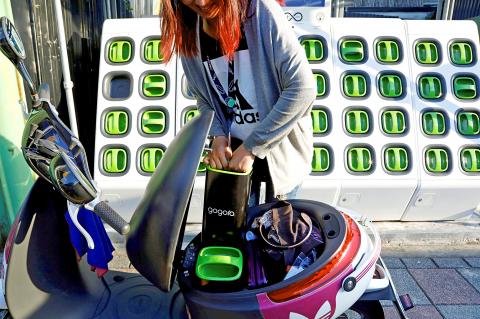Electric scooter maker Gogoro Inc (睿能創意) yesterday announced plans to launch a scooter-sharing service in Japan with Japanese conglomerate Sumitomo Corp.
Unlike the scooter rental service Gogoro introduced in Berlin and Paris, the GoShare service in Japan would feature an open battery-swapping system that could also be used to power four-wheel vehicles in the future, the company said in a statement.
In partnership with Sumitomo, one of its major investors, Gogoro said the service would be launched in the southern Japanese island of Ishigaki this year and expand to other cities next year.

Photo: Tyrone Siu, Reuters
The company did not provide a detailed schedule.
Gogoro last week announced that it had raised US$300 million from global investors, including Sumitomo and Singapore’s Temasek Holdings Pte, in its latest round of funding.
The company declined to reveal how many of its scooters would come from Japan.
Company data showed that Gogoro provided a total of 1,600 scooters in Berlin and Paris for its sharing service in Europe.
The company is working on building a connected network and battery-swapping system around the world, Gogoro cofounder and chief executive officer Horace Luke (陸學森) told a news conference earlier this month in Taipei.
The company’s expansion plan is different from Tesla Inc’s strategy, which aims to develop more fast-charging stations worldwide, Luke said.
Gogoro deploys more than 400 GoStation battery-swapping stations, with 17,000 batteries swapped for 40,000 users per day globally.
The company has seen 6 million batteries swapped since 2015, data showed.
Company statistics showed that Gogoro remained Taiwan’s largest electric scooter supplier last month, with an 85.1 percent share and sales of 4,753 units, more than doubling from 1,454 units a year earlier.
The company also ranked the fourth-largest scooter supplier in the local market, behind Kwang Yang Motor Co (光陽工業), Yamaha Motor Taiwan Co (台灣山葉) and Sanyang Industry Co (三陽工業).

To many, Tatu City on the outskirts of Nairobi looks like a success. The first city entirely built by a private company to be operational in east Africa, with about 25,000 people living and working there, it accounts for about two-thirds of all foreign investment in Kenya. Its low-tax status has attracted more than 100 businesses including Heineken, coffee brand Dormans, and the biggest call-center and cold-chain transport firms in the region. However, to some local politicians, Tatu City has looked more like a target for extortion. A parade of governors have demanded land worth millions of dollars in exchange

Hong Kong authorities ramped up sales of the local dollar as the greenback’s slide threatened the foreign-exchange peg. The Hong Kong Monetary Authority (HKMA) sold a record HK$60.5 billion (US$7.8 billion) of the city’s currency, according to an alert sent on its Bloomberg page yesterday in Asia, after it tested the upper end of its trading band. That added to the HK$56.1 billion of sales versus the greenback since Friday. The rapid intervention signals efforts from the city’s authorities to limit the local currency’s moves within its HK$7.75 to HK$7.85 per US dollar trading band. Heavy sales of the local dollar by

Taiwan Semiconductor Manufacturing Co’s (TSMC, 台積電) revenue jumped 48 percent last month, underscoring how electronics firms scrambled to acquire essential components before global tariffs took effect. The main chipmaker for Apple Inc and Nvidia Corp reported monthly sales of NT$349.6 billion (US$11.6 billion). That compares with the average analysts’ estimate for a 38 percent rise in second-quarter revenue. US President Donald Trump’s trade war is prompting economists to retool GDP forecasts worldwide, casting doubt over the outlook for everything from iPhone demand to computing and datacenter construction. However, TSMC — a barometer for global tech spending given its central role in the

The Financial Supervisory Commission (FSC) yesterday met with some of the nation’s largest insurance companies as a skyrocketing New Taiwan dollar piles pressure on their hundreds of billions of dollars in US bond investments. The commission has asked some life insurance firms, among the biggest Asian holders of US debt, to discuss how the rapidly strengthening NT dollar has impacted their operations, people familiar with the matter said. The meeting took place as the NT dollar jumped as much as 5 percent yesterday, its biggest intraday gain in more than three decades. The local currency surged as exporters rushed to